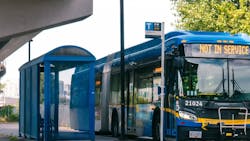TransLink to cut transit services in half by 2025 without new funding model
TransLink has released a new report detailing potential future transit service cuts that would be necessary at the end of 2025 if a new transit funding model is not established.
According to the report, the agency is facing a funding gap of approximately C$600 million (US$434 million) each year – a shortfall in the budget to operate current transit service levels throughout the region. TransLink recently announced C$90 million (US$65.1 million) in corporate cost-efficiency and revenue measures to help reduce the funding gap.
The report, which was prepared at the request of the Metro Vancouver’s Mayors’ Council, reveals the C$600 million (US$434 million) annual operating budget shortfall would result in significant cuts to all transit services, including cutting bus service in half, reducing SkyTrain and SeaBus trips by up to one-third and potentially eliminating the West Coast Express commuter service.
“These cuts would be devastating to the region and we’re doing everything we can to stop them from happening,” said TransLink CEO Kevin Quinn. “Unfortunately, this is a window into our reality if a solution to our outdated funding model is not implemented. We need all levels of government to come together to protect and expand transit service to meet the needs of Metro Vancouver’s growing population.”
TransLink notes relief funding from the government of British Columbia has been pivotal in protecting service levels since the COVID-19 pandemic, which has resulted in TransLink being a leader in ridership recovery for major transit agencies in Canada and the United States. However, the relief funding is coming to an end in 2025 and a new solution is required to address this gap.
If a solution is not found next year, potential cuts to transit services could include:
- Cutting bus service in half, including cancelling up to 145 bus routes and all NightBus services
- Reducing SkyTrain and SeaBus services by up to 30 percent
- Eliminating West Coast Express
- Reducing HandyDART by 35 percent
- Eliminating the Local Government Funding Program, which invests in road maintenance and local infrastructure upgrades
The reductions to transit service would significantly impact the entire Metro Vancouver region:
- More than half a million people will no longer be living within walking distance of a transit stop, disproportionately impacting those who are low-income, visible minorities, shift workers, youth and seniors.
- There would be almost no transit services operating in Langley, White Rock, South Delta, Port Coquitlam, Maple Ridge, Pitt Meadows and much of the North Shore, British Columbia.
- Thousands of more cars would be added to the already-congested streets and bridges, with congestion worsening by 20 percent.
- Employers in health care, childcare, hospitality, construction and major industries would face the prospect of employees who can no longer make it to work.
- Once service is cut, it would take at least a decade to return transit services and ridership back to current levels, even if investments return.
"Cuts to transit services in Metro Vancouver would be unacceptable; they would result in crippling congestion, devastating environmental impacts and would leave hundreds of thousands of people stranded,” said Chair of the Metro Vancouver Mayors’ Council Brad West. “Our region is growing at a record pace at the same time as facing an affordability crisis, both of which require more, and not less, transit. The mayors are ready to do their part but we need the next provincial government, as well as the federal government, to work with us to ensure these cuts to transit services never happen and begin expanding our system rapidly in line with growing needs.”
On July 17, the government of Canada launched the Canada Public Transit Fund, which will invest C$30 billion (US$21.9 billion) during the next 10 years to expand public transit and make it more accessible across the country. However, that funding focuses on expansion, upgrades and maintenance needs and does not address operational expenses.
While TransLink is seeking approximately C$600 million (US$434 million) in annual operating funding to avoid transit service cuts, it also requires new funding to expand transit services through the Access for Everyone plan, which includes doubling bus service and adding projects such as the UBC SkyTrain extension, a new rapid transit link to the North Shore the Burnaby Mountain Gondola and new bus rapid transit routes.
TransLink is asking all levels of government to develop a sustainable funding model that would allow transit services to keep up with Metro Vancouver’s growing population. There are several issues with TransLink’s current funding model, including:
Decline in revenue from fuel taxes
- The regional shift toward electric and hybrid vehicles is causing a decline in fuel tax revenue.
- In 2023 alone, TransLink collected C$34 million (US$24.6 million) less revenue from the fuel tax than in 2022, with the losses projected to grow during the next decade.
Fare increases below inflation
- Costs of construction, labor, fuel, maintenance and new vehicles have been increasing at unprecedented rates.
- Additional operating costs for expanding bus service and for new expansion projects like the Broadway Subway Project and Surrey–Langley SkyTrain, which will require significant funding to operate once complete.
Increasing costs and expansion
- Due to the COVID-19 pandemic, the 2020 fare increase was cancelled and held at levels below inflation in 2021-2024.
- With no fare increase in 2020 and 2.3 percent increases in all subsequent years, TransLink’s costs have risen faster than fare prices have increased.
The Canadian Urban Transit Association (CUTA) is urging the federal and provincial governments to come together to develop a comprehensive and sustainable funding model, which includes considering alternative revenue sources, ensuring fare adjustments keep pace with inflation and investing in the expansion of transit services to meet the needs of Canada’s growing urban populations.
“Public transit is essential for making cities more affordable, connecting new housing developments and supporting economic productivity,” said Marco D’Angelo, CUTA’s president and CEO. “All residents, regardless of their economic status, deserve frequent and reliable transportation options.”
Unifor, Canada’s largest private sector union, like CUTA, is calling for all levels of government to come together to address the funding needs.
"We need strategic collaboration to fund public transit to keep our cities moving and to support good union jobs," said Lana Payne, Unifor national president. "Governments must work together to solve this funding crisis and protect our transit systems."
"Public transit is a cornerstone of sustainable urban development and essential for reducing traffic congestion and environmental impact," said Gavin McGarrigle, Unifor western regional director. "It is crucial for governments to recognize the value of robust public transit systems and to invest accordingly."
About the Author
Brandon Lewis
Associate Editor
Brandon Lewis is a recent graduate of Kent State University with a bachelor’s degree in journalism. Lewis is a former freelance editorial assistant at Vehicle Service Pros in Endeavor Business Media’s Vehicle Repair Group. Lewis brings his knowledge of web managing, copyediting and SEO practices to Mass Transit Magazine as an associate editor. He is also a co-host of the Infrastructure Technology Podcast.

